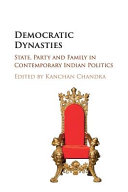
Democratic Dynasties: state, party, and family in contemporary Indian politics
By - Chandra, Kanchan
Floor
-
Floor 1
ISBN 10 - 1107558913
ISBN 13 - 9781107558915
Book Status
-
1 Qnty Available with us.
Shelf No
-
15
Call Number
-
320.954 DEM
Physical Description
-
xxii, 279 pages ; 24 cm
Notes
-
includes index